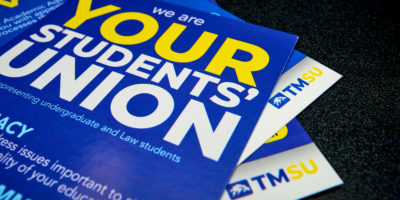By Michelle Halpern
In an ego-boost to our cash-strapped institution, Ryerson has been ranked the number one primarily-undergraduate Canadian university for providing the leaders of tomorrow.
According to the national survey conducted by Maclean’s magazine, Ryerson’s reputation is soaring high in the eyes of employers and high school guidance counsellors, but we’ve got little else going for us.
The university was ranked 16th overall out of 21 primarily undergraduate schools.
But we ranked second most innovative and fourth in overall reputation.
“This is really good news for Ryerson,” said Ann Dowsett Johnston, author of the study. “You should be very proud.”
But how do we explain the discrepancy? Why, with such a high reputation, is Ryerson still at the bottom of the pile in its overall ranking?
“Because it’s an Ontario university,” Dowsett Johnston said.
Ontario has 40 per cent of the country’s university students and there’s just not enough government money to go around. The number of university students has been rising in current years, but the average funding per student in constant dollars — taking inflation into account — has been declining.
“To rise as a university with this much crunch and crowding is amazing,” she said.
Ryerson went up three spots from its 19th-place overall ranking last year. It was one of only six Canadian universities to go up by three or more spots.
Ryerson president Claude Lajeunesse said he was pleased to see the university rising in the rankings, but that he did not feel the ranking fairly represented the quality of Ryerson’s programs.
“Would I want to admit that we are number 16 in journalism and engineering and business?” No,” he said.
Lajeunesse, who helped develop the currently-used ranking system 10 years ago when he was president of the Association of Universities and Colleges of Canada, said he thought the survey was not an accurate measure because it compared Ryerson to much smaller universities in categories such as class size.
“Some of it is very accurate and reflects the situation,” he said. “Others are not in my view reflective of where Ryerson is in terms of overall presence.”
Aaron Caine, a second-year marketing student, said Maclean’s survey was a good indicator of Ryerson’s strengths and weaknesses. “Our library is terrible,” he said. “Maclean’s got that right.”
Out of all 47 Canadian universities surveyed, Ryerson had the lowest amount of library holdings per student — the amount of volumes in our library divided by the number of full-time-equivalent students. Ryerson’s 74 volumes per student is a laughing matter compared to Acadia’s 364, or the University of Alberta’s 349.
Library administrators seem to understand the problem: over 39 per cent of the library’s budget is allocated to updating the university’s collection. That makes Ryerson fifth in the category for library improvements. But the university is not reciprocating that drive for progress. The percentage of Ryerson’s budget allocated to maintaining its library — 3,82 per cent — is, once again, the lowest in the entire country.
In fact, although Ryerson’s tuition puts it smack in the middle of that category, its operating budget — $6,567 per full-time student — puts it at the bottom of the pack: 18th out of 21.
“I think we don’t have the money we need to provide all the support we want in the library,” said Lajeunesse. “We don’t have as much money as other universities per student, so that is reflected in finance and so on.”
Eman Jamie, a second-year journalism student, saw some discrepancies in the survey. “First of all, Ryerson is very different from all the other schools in our category. We’re more practical and everyone else is more theoretical,” she said. “Secondly, they don’t measure what the students think of the school. Personally, I love Ryerson because I have small classes where professors know my name.”
You wouldn’t know that from reading the survey, which states Ryerson had the largest amount of third and fourth-year students in classes of more than 100. It was behind only four other schools when this measure was applied to first and second-year students.
So what does that mean to the students in the double cohort year?
“It makes it very confusing,” said Jason Stein, 18, a Thornhill High School student who is part of the crunch. “I’m thinking about applying to Ryerson because it seems to have such a good reputation,” he said. “But then I look at the overall rankings and they make me think twice.”
Lajeunesse said judging Ryerson based solely on its Maclean’s ranking would be a mistake, but Stein wasn’t so sure.
“I’ve worked extra hard for the past two years so my grades would get me ahead of the double cohort competition,” he said. “I don’t know if I’d want to waste that on a school that seems to have so many flaws.”











Leave a Reply